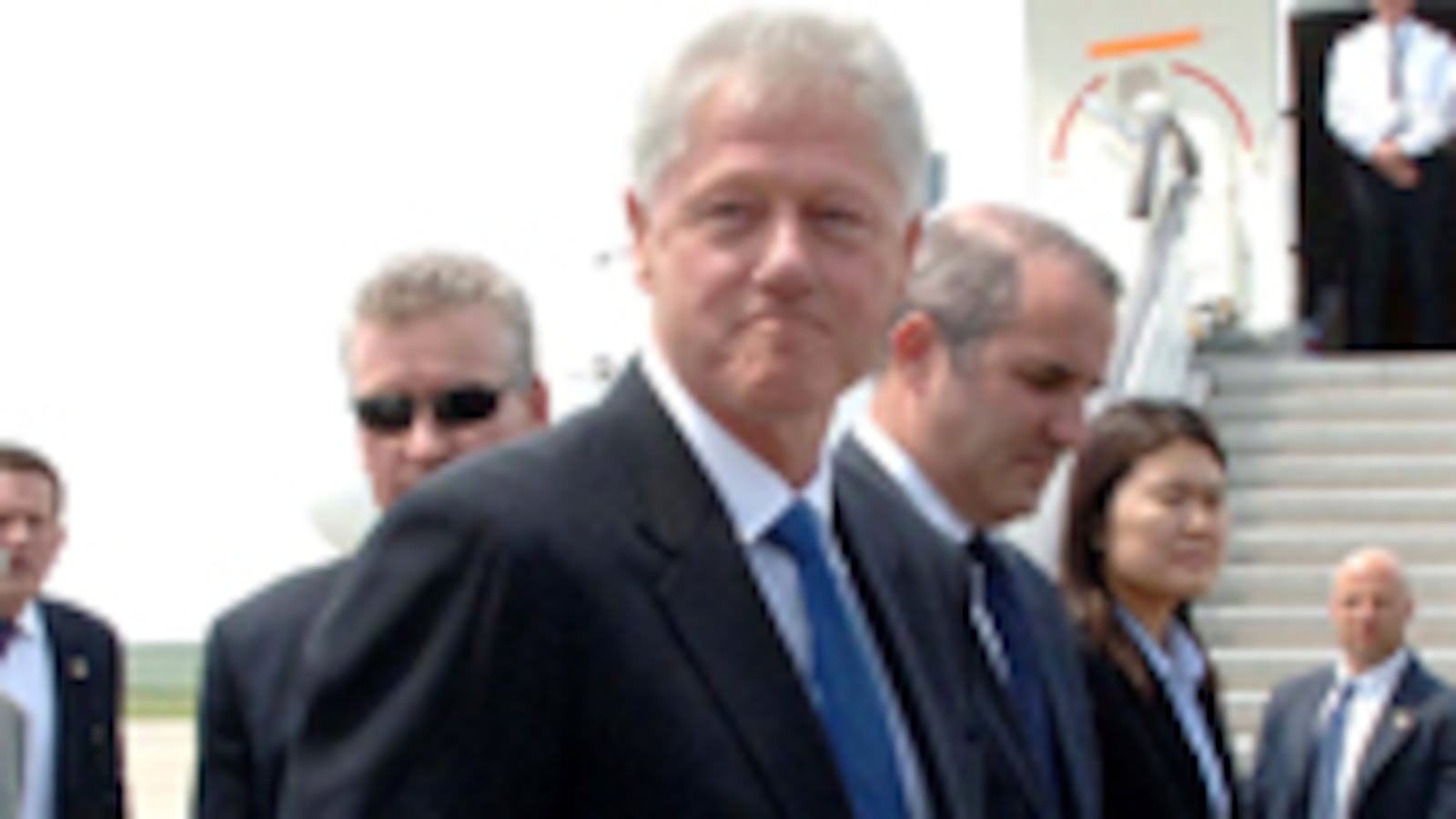
Bill Clinton’s furtive mission to North Korea this morning to negotiate the release of jailed American reporters Laura Ling and Euna Lee had a greater chance of succeeding than most realized, thanks to an innocuous but important gesture last month that provides some cover for the leaders of a country obsessed with—and driven by—perceived respect.
While observers can titter about how Bill is trying to rescue his wife, the secretary of State, and his running mate, Al Gore, whose Current TV employs the jailed reporters, more attention needs to be paid to a phone call last month. Specifically, Ling, whom along with Lee was sentenced to 12 years hard labor after wandering across the border from China, made explicit in the permitted phone call to her famous sister, TV personality Lisa Ling, that she “broke the law.” A coerced confession? More North Korean mind games? On the contrary. It was a very positive step.
Laura Ling made three phone calls to her family in the states. That's three more than I got in prison in South Korea.
First, if you’ve done wrong (and sometimes even when you haven’t; after all, Ling and Lee were at the mercy of their captors regardless of what actually occurred there on the border) admitting one’s guilt, showing remorse, and asking for mercy is the Confucian way. By doing so, one at least has a chance of getting back into the authority’s good graces.
This story reminded me very much of my experience of being held and tried for a crime in South Korea in the 1990s. Yes, North and South have their obvious differences, but they are far more alike in their Confucian roots than people realize (before the rift of the still relatively recent Korean War, the Korean people had been more or less unified under one state for a thousand years).
In advance of my criminal trial in Seoul in 1994—I had stupidly mailed myself hashish from the Philippines; the indiscretion of a 23-year-old—Korean guards and prisoners at the Seoul Detention Center urged and recommended me, as they did the other foreign prisoners as well, not only to plead guilty to my offense (I was guilty) but more importantly to show remorse in front of the judges. To do so, I heard from every corner, I should learn how to say something specific in Korean: Young so hey choo ship sho. “Please grant me mercy” (the ship sho at the end connoting great respect and formality).
Many of the other foreign prisoners were taught this phrase as well, and like me said it in court to the judges. Even if we knew nothing else in Korean, we should know this phrase, so important was it for conveying the proper and practical attitude as suspects, detainees, and lawbreakers.
Asking for mercy didn’t mean that you would be sent home and all would be forgiven without a price, but it did affect the judges’ sentencing, allowing them to exercise leniency, and it at least gave you a chance of improving your situation and winning sympathy from the authorities.
The other tack—denial, resistance, lack of contrition—especially if there is evidence of your guilt, is untenable and unadvisable in the Confucian moral cosmos and almost always, as I saw, results in harsher treatment and punishment. Indeed, even if there is scant evidence of your guilt, you are still up against it just being suspected of some wrongdoing: even in South Korea, the democratic, modern half with a far more progressive notion of human rights, the conviction rate in criminal trials is amazingly high, above 95 percent; so imagine then what it must be like in the North.
The second reason that Laura Ling’s statement that she and Lee did break the law and were not then simply unwitting victims of the nefarious North Korean state was a wise and positive step is that it allowed the North Korean authorities enough “face” to release the two reporters. The North then would be letting them go out of mercy and clemency, they could legitimately claim, and have the event be a show of their magnanimity. To have this cover, this “face” in place, is absolutely vital to the two women’s chances of getting out.
Secretary of State Clinton’s public comments last month—describing the remorse of the two reporters and their families and asking North Korea to grant Ling and Lee “amnesty”—were an excellent step in this direction. Bill presumably continued on that tack.
There were other positive signs: the AP reported that Laura Ling made three phone calls to her family in the states during her imprisonment. That’s three more than I got in prison in the South. And we certainly didn’t get visits from doctors, as has been reported in the case of Ling and Lee.
Also, as some knowledgeable observers correctly predicted at the outset, the two women had apparently not been taken to a prison camp. They were, according to a Korea expert and recent visitor to Pyongyang, being held in a guesthouse. This was my prediction as well: that the North Korean state won’t want them to see the actual prison camps. The women were journalists after all. And even in the South there was a strong and ever present sense of the authorities trying to shield and separate us foreigners from the raw realities of the Korean underbelly. We were put into our own cellblock, and there were serious qualms about letting us live and work among the Korean convicts in the prison factories. In addition, prison rule forbade us from writing about the prisons, and guards and officers often told me to speak well of Korea, to give a favorable impression back to the world at large after my release. (Interestingly, only a few weeks ago South Korea announced the opening of its first ever “ foreigners only” prison.)
Ling and Lee were in deep, there was no doubt. But considering the situation, there were a number of signs fortelling Bill Clinton's positive conclusion to this affair. Young so hey choo ship sho. Looks like Bubba knew enough Korean to get those words out.
Cullen Thomas is the author of Brother One Cell: An American Coming of Age in South Korea’s Prisons, a 2008 Kiriyama Prize Notable Book. His work has also appeared in the New York Times Magazine, Salon, the Washington Post, the Korea Times, and GQ, among other publications.





